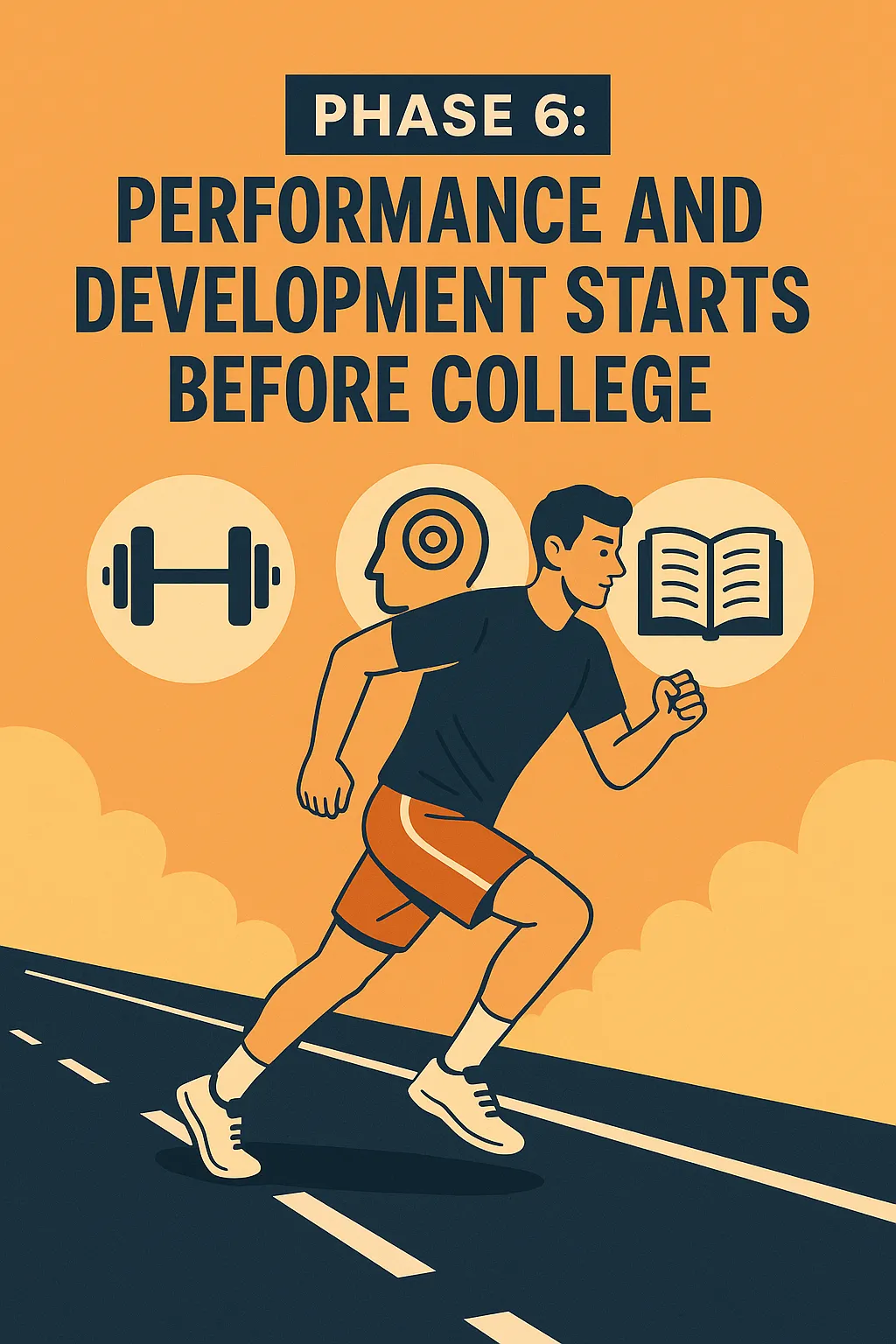
How To Navigate The Recruiting Maze:Phase 6: Performance and Development Starts Before College
Phase 6: Performance and Development Starts Before College
The decision is behind, but the true test for athletes begins the moment the commitment is made. Phase 6 isn’t a waiting room, it’s an active runway. Athletes who treat the months before college as preparation, not downtime, arrive ready to compete for playing time, show academic consistency, and make a real impression on coaches. Getting a leg up comes down to effort, focus, and the discipline to use every day to prepare for the demands of college athletics.
Physical Readiness Sets the Standard
Coaches notice who shows up in shape and who drags through the first practice. Following the strength and conditioning packet is non-negotiable if one is provided. For those who want to match or exceed the college pace, hiring a trainer or joining a performance program tailored for collegiate athletes can make a visible difference. Tracking sleep, hydration, and nutrition rounds out the essentials, these details show up in stamina and recovery, not just weight room numbers. Athletes who invest in their bodies over the summer build an unshakeable foundation and send a clear message about their commitment to the program.
Sharpening Mental Discipline for the Next Level
Mental discipline often separates those who contribute early from those who watch from the sidelines. Visualization is a proven tool: running through college practices and game scenarios in the mind prepares athletes for the speed and complexity of the real thing. Time-blocking daily routines, mirroring a college athlete’s schedule, builds habits that ease the transition. Learning to reset after a bad rep or tough feedback is crucial, college sports demand resilience and the ability to bounce forward, not just back.
Building Academic Habits That Last
Academic consistency is a pillar of college success. Taking a summer class keeps the mind sharp and signals to coaches a serious approach to eligibility. Organizing key academic dates, registration, orientation, and first exams, prevents surprises. Athletes should also familiarize themselves with support resources on campus, such as tutoring and study halls. These habits make the academic side of college less stressful and help maintain focus when the season ramps up.
Coach Communication: Earning Trust Early
Strong coach communication begins before anyone steps on campus. Asking coaches what they expect from incoming players demonstrates maturity and initiative. Sending video updates or progress reports, when appropriate, shows commitment without coming across as needy. Learning to receive and apply tough feedback is a skill that accelerates growth and proves coachability. For more perspective on effective communication, see this guide to recruiting as a role player.
Understanding and Owning Your Role
Playing time is earned every day, not handed out. Learning the potential depth chart and where one might fit gives honest insight into the challenges ahead. Identifying growth areas based on the college system, whether it’s defensive schemes, tempo, or position-specific skills, lets athletes tailor their preparation and stand out when opportunity knocks. The more prepared an athlete is for their likely role, the faster they can contribute.
Smart Game Planning for Early Impact
Follow the strength and conditioning plan with intent
Visualize and rehearse the college pace, both physically and mentally
Stay on top of academics with summer coursework and organized calendars
Initiate coach communication and embrace constructive feedback
Study your likely position and set specific goals for improvement
Leveraging Resources for a Competitive Edge
Many resources are available for athletes looking to maximize their college preparation. Performance programs, nutritionists, and academic advisors can all play a role. Online communities and blogs, like the FTP Information Portal, offer actionable advice and support. Connecting with upperclassmen or recent alumni can provide real-world insights on what to expect and how to thrive in the first year.
Why Early Reps Go to the Prepared
Effort creates opportunity. Athletes who treat the pre-college phase as a proving ground often find themselves earning early reps and more meaningful roles. College coaches value players who arrive ready to contribute, not just athletically but in the classroom and locker room. The runway to college is short, use it wisely, and it will carry you further.
Preparation Is a Mindset
True preparation never waits for the whistle. Every choice, from nutrition to communication, is a step toward earning meaningful playing time and respect. Those who treat summer as a launching pad, not a break, shape their own future. The next phase isn’t pending, it’s already underway.





